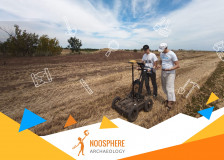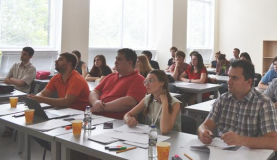Crisis of Attitude Towards Knowledge? Modern Understanding of the Role and Place of Knowledge

1st of September is a wonderful occasion to contemplate the role of knowledge in our lives. The official celebration of knowledge has long served as a chronological marker for the start of the educational process at schools and universities. However, knowledge as an object is not included in today's agenda.
CRISIS OF ATTITUDE TOWARDS KNOWLEDGE
The starting point for discussions of this kind can be the saying: "A rational person has always been asking questions about how the world is structured, the curiosity of our minds has tried to unravel the mysteries of nature." Of course, the endless abundance of natural phenomena is described by some finite set of primary entities and their relationships. And the result of understanding (whether it's through observation or contemplation) of these entities is knowledge – this building material from which we build the picture of the world.
The modern discussion about knowledge, artificially reduced to a consideration of "usefulness," actively promotes the idea that what matters is the knowledge that brings utility or profit. "Pragmatism has taken over the world," says Igor Khanin, pointing out that not everything should be measured by relevance, money, efficiency, or profitability, and that by doing so, we lose sight of truly important things. Italian philosopher Nuccio Ordine, in his manifesto "The Usefulness of the Useless," asserts that "...knowledge that is considered useless (not profitable) is fundamental for humanity." This perspective highlights the importance of valuing knowledge for its intrinsic worth and its potential to enrich human understanding and culture beyond immediate practical benefits. Indeed, it appears that we often unwittingly lose sight of what is truly important, potentially leading to a form of intellectual blindness.
Figures like Nicolaus Copernicus, Isaac Newton, Dmitri Mendeleev, James Clerk Maxwell, Albert Einstein, Niels Bohr, Vladimir Vernadsky, and others were not guided by pragmatism in the eyes of their contemporaries. Their discoveries and achievements seemed utterly useless from a business perspective, as they did not immediately yield profits or solve pressing business problems. However, their monumental discoveries and contributions significantly enriched the world of science and brought about something far greater. Absolutely, these great thinkers challenged sacred theories, dogmas, and stereotypes, and they transcended national boundaries. This means that knowledge and science became a planetary phenomenon – knowledge cannot be confined to one place and not manifest itself elsewhere. Vladimir Vernadsky's genius was in recognizing this phenomenon, which he referred to as the Noosphere, as the highest level of organization of human mind. The accumulation of knowledge has indeed spurred cultural and philosophical transformations, setting entire continents in motion. The Renaissance, the Modern Age, and industrial revolutions are milestones primarily driven by education and scientific progress. Each discovery represented a breakthrough in our understanding of the structure of the world – what we observed, we could comprehend, explore, and describe. The picture of the world rapidly expanded, leaving less room for the "unexplained" or the "supernatural." Our scientific horizons have reached the scales of both the macro and microcosms – today, humanity's tools are capable of exploring the Universe within a range from 10-32 to 1026 meters. And all of this is thanks to the so-called 'useless knowledge.' Against this backdrop, there is an evident crisis in our relationship with knowledge – in the collective consciousness, this concept is reduced to the necessity of obtaining formal education, experience, and practice, thereby nullifying and diluting the fundamental mission of knowledge as a planetary instrument for the harmonious development of humanity and nature.
The crisis in our relationship with knowledge is evidently rooted in the distortion of our value system, which fails to accommodate pure knowledge and unconditional science. A coordinate system that treats both "useful" and "unnecessary" knowledge as equally valuable must fundamentally contain the right cultural landmarks, where the focus is not solely on the pragmatism of life (as a life necessity) but also on our relationship with the future of nature and humanity.
KNOWLEDGE AND THE INFORMATION SOCIETY
A characteristic feature of our time is the widespread use of digital technologies, resulting in the transformation of societal relationships and the emergence of an information society. In this context, there is a shift in the fundamental axis of interaction from "human-nature" and "human-human" to "human-information". Modern information processing tools allow us to use information models as analogs of the real world. Digitized mathematical models, as reflections of objective reality, have become the mediated subject of research. This has disrupted the age-old practice of direct contact between the object and the researcher.
Max Polyakov and Igor Khanin point out that
The emergence of information and communication technologies (ICT) has indeed disrupted traditional information practices, disturbing the unity and harmony that had developed over centuries between the processes of data processing and application.
An important characteristic of the information society is the fact that knowledge is available to absolutely everyone – it is just a search query away.
In the early 20th century, Vernadsky noted the increasing dynamics of scientific creativity. In the mid-20th century, John von Neumann predicted the moment when human knowledge would no longer keep pace with technological development. In the early 21st century, Ray Kurzweil popularized the concept of technological singularity – a point in time when accumulated knowledge and technologies would become inaccessible to the human mind.
It may seem that the presence of "accelerators" in the form of ICT, the accumulation of knowledge, and their accessibility should accelerate scientific progress and knowledge accumulation. However, we do not observe significant leaps in worldview. In other words, while the volume of knowledge is growing, it does not necessarily lead to substantial advancements; we seem to be stuck in place, and the "information bubble" is expanding. What we see is a form of inflation, where a unit of knowledge loses its significance and value over time. Knowledge inflation is a phenomenon familiar to many – on an individual level, it manifests as the loss of relevance of acquired knowledge over time. What was a valuable skill or practice yesterday can become obsolete today. Indeed, there is a positive aspect to this phenomenon, particularly in terms of creating an external demand for continuous updating of individual knowledge – lifelong learning. However, on a global scale, it can feel like we are running in place. Mamardashvili suggests a way out of this situation through a "destruction-reconstruction of understanding," a kind of revision of the ontological foundations of our perception of the world. This is a highly challenging exercise! In this context, the role of the individual becomes extremely significant because revision, review, reconstruction, and reformulation undoubtedly require not only outstanding moral and volitional qualities but also the ability to resist sacralized dogmas and stereotypes in science, society, culture, and business.
NOOSPHERE ENGINEERING SCHOOL
Engineering should be understood in a broad sense as a conscious activity aimed at achieving specific results. The Noosphere Engineering School is not just a place for youth project activities. We see it as a prototype of the noosphere – an organized network for the exchange of knowledge, as a platform for scientific and engineering creativity. In the era of knowledge inflation, there is a growing need for finding new formats for acquiring relevant knowledge. The inertia and inflexibility of both traditional education systems and academic research do not contribute to effectively addressing this challenge. The synergy between business, science, and education within the framework of the Engineering School precisely forms the necessary bridge between the practical and theoretical aspects, allowing for the transformation of scientific knowledge into the applied realm.
We see the organization of project activities for students as a crucial task. In this context, a project, derived from the Latin "projectus," means "thrown forward." In this context, project-based activities represent a particular school of life where young people can excel. In our view, this approach is the only correct one for identifying and supporting "rock stars" – individuals who are ready and capable of expressing their passion and who should become the trailblazers for future transformations, as mentioned earlier.
* Passion, derived from the French word "passionner" meaning "to inspire, to arouse, to ignite passion," is an irresistible internal drive toward activities aimed at changing one's life, the surrounding environment, or the status quo.
Furthermore, the Noosphere Engineering School is also:
• a space for creative freedom, freedom of thought. We firmly believe that only free individuals are capable of transforming the world, uniting, and coming together around ideas;
• a hub for innovation, capable of changing the world;
• a platform for promoting innovative activities, science, knowledge, and engineering;
The activities of the Noosphere Engineering School are closely linked to knowledge. We value, respect, and are ready to enhance them.
Join us!
Інші новини
Підписуйтесь для отримання останніх новин
Бажаєте реалізувати свій проєкт?
Зв'яжіться з нами і ми допоможемо втілити ваші ідеї в життя!


